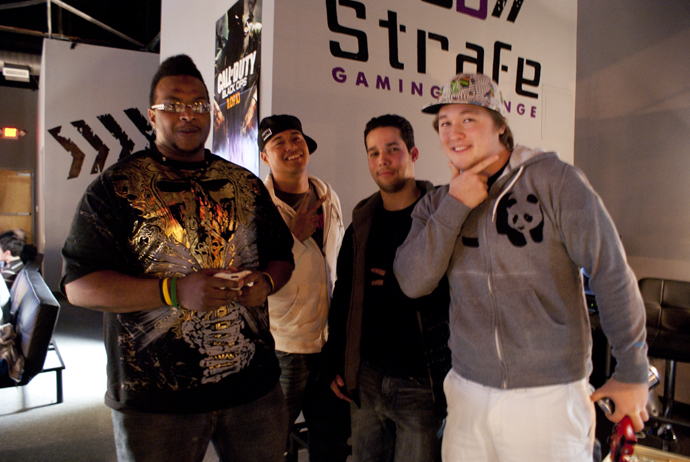The chiptune sounds that once emanated from within the walls of arcades have long faded into darkness; the affordable nature of modern console and PC gaming effortlessly decimated the away-from-home competition. It leaves something to be wanted, though - with virtually no reason to leave the house these days, especially with the explosion of powerhouses like Newegg and Amazon, gamers have to find a reason to converge at a common ground and compete. If our trip to this year's Raleigh MLG event taught us anything, it's that internalized competition is far more ferocious, and irrefutably more entertaining for even the spectators. This was proven yet again when I attended a small local tourney at Strafe for Halo: Reach. Although the prize money and attendance is far from anything like MLG or PAX Prime, the high-octane competition is the same; gamers want to give it all, and if lucky, walk home with a couple bucks more than they arrived with.

The culture of 'same room gaming' is something that isn't readily available anymore. What used to be easily found in shopping centers everywhere has followed a sure-set death spiral into oblivion: LAN centers (or as Strafe calls itself, 'gaming lounge') have emerged as the only remnant of our nostalgia-inducing arcades, with competitions and tournaments giving them a chance against otherwise rooted gamers. When asked what it was that made LAN tournaments more thrilling than web-based competitions, Cody Lynn told me he was a fan of "the exposure and the atmosphere." Similar statements were issued from all gamers, Jimmy Ledbetter - whose team ranked third - said "It's more intense. You have to show off." Being incapable of playing without a keyboard and mouse myself, I was somewhat surprised to feel the intensity in each match; I'm no stranger to ladder-based competition (as often is overly boasted on the forums!), but I am relatively apathetic toward console gaming. However, observing the teams flip back-and-forth over a single point is equally intense for gamers as it is for spectators - especially those of us that have experience in tournaments.
The tension is tangible, and despite a few disappointed groans, everyone gets along (generally) well in the end. As written in my the meaning of "gamer" article, gaming customs have even worked their way into non-technical walks of life; it's a cultural emergence that begs attention from everyone, and LAN gaming epitomizes everything we know in one room: entertainment, competition, and domination. I can't count the number of times I heard "RAPED!" or "OWNED" shouted over the low wall that divided the teams, but it was all in good spirit (although, to a mortal, could be somewhat frightening). The teams worked extraordinarily well together - I observed as players wordlessly expressed the need to flank a staircase, take the low-ground while the other takes the high-ground, or where to throw grenades. When an opponent was shot and not killed, the shooter might call out "shot once" to his teammate, indicating how much health remains; it was incredible teamwork, proving that skill isn't necessarily paramount to communication.

"When it comes game time you gotta perform. Composure is the number one thing in gaming," Tre Cloude, a member of the second placing team told me, "It's all about meeting new people, the atmosphere, and composure." He's right: the atmosphere and people are definitely the key contributor to the exclusiveness of tournaments. Attend PAX, E3, or MLG tournament, and it's instantly noticeable that gamers from all genres are exchanging volleys of who owned whom, talking about genre superiority, or just hanging out. Spectators can have just as much fun, especially - and I can't stress this enough - when you get to listen to top-notch commentators like HuskyStarcraft or his co-commentators (see the MLG article, we broke it down pretty well there). They bring a whole new level of invigoration to gaming that would otherwise make for a boring sport. Hearing the screams of "PSSSSIIIIIIIIIISTOOOOOOORRRRMMMMM!" crackling through the speakers (which fail to equalize the spontaneous burst of noise) is entirely worth the attendance fees or time investments.
Simply put: same-room gaming provides a tremendous opportunity to hang out with the real players, who act just the same as they do online - immaturely, loud, singing poorly, and having an awesome time. As stated innumerable times after my visit to PAX, it's the kind of environment I would live in each day if possible. The exposure to gamers is great, and the competition is just freakin' awesome when you can jokingly (or not so much) scream in your now-dead opponent's face. Hearing their desperate smashing of the controls in useless attempt to evade your incoming projectiles is second only to one element of localized gaming: the rematch.